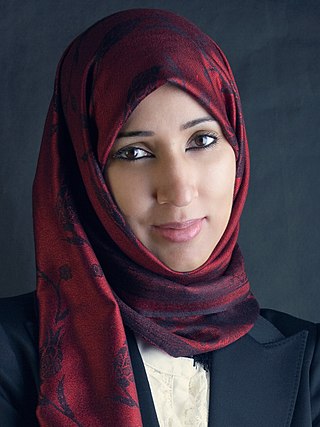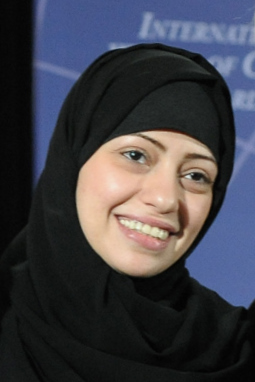
Human rights in Saudi Arabia are a topic of concern and controversy. Known for its executions of political protesters and opponents, the government of the Kingdom of Saudi Arabia has been accused of and denounced by various international organizations and governments for violating human rights within the country. An absolute monarchy under the House of Saud, the government is consistently ranked among the "worst of the worst" in Freedom House's annual survey of political and civil rights and was in 2023 ranked as the world's most authoritarian regime.

Women's rights in Saudi Arabia is a topic of concern and controversy internationally. Women in Saudi Arabia experience widespread discrimination in Saudi politics, economy and society.
Al-Ha'ir Prison, also known as al-Hayeral-Hayar or al-Haer, is a Saudi Arabian political, maximum-security, Mabahith-affiliated prison located approximately 25 miles south of Riyadh. It is the largest prison complex in Saudi Arabia and houses both men and women. Facilities include isolation cells, and physical torture rooms. Reportedly, a number of members of al-Qaeda are held there. There is also confirmation of unfavored royal family members being held there which include princess and princes, journalists, business rivals, political rivals, international prisoners or any alleged dissidents or persons deemed worthy of needing be silenced, made an example of, and destroyed psychologically and physically. Many people have been held without charge, have no current, pending, or even past court dates, nor future release date. Past prisoners report being subject to constant psychological, environmental, physical, social and sexual torture. Many noted persons are confirmed to be held there under these conditions and many other individuals suspected to be there, as the Saudi government limits communication for captives and refuse to provide information concerning certain detainees as a policy.

Manal al-Sharif is a Saudi women's rights activist who helped start a right to drive campaign in 2011. Wajeha al-Huwaider filmed al-Sharif driving a car as part of the campaign. The video was posted on YouTube and Facebook. Al-Sharif was detained on 21 May 2011, released, and then rearrested the following day. On 30 May, al-Sharif was released on bail, on the conditions of returning for questioning if requested, not driving, and not talking to the media. The New York Times and Associated Press associated the women's driving campaign as part of the Arab Spring and the long duration of al-Sharif's detention due to Saudi authorities' fear of protests.
Hatoon Ajwad al-Fassi is a Saudi Arabian historian, author and women's rights activist. She is an associate professor of women's history at King Saud University in Saudi Arabia, where she has been employed since 1989 and at the International Affairs Department at Qatar University. At the university, al-Fassi carries out historical research. Al-Fassi claims from her research into the pre-Islamic Arabian kingdom of Nabataea that women in the kingdom had more independence than women in modern Saudi Arabia. Al-Fassi was active in women's right to vote campaigns for the 2005 and 2011 municipal elections and was active in a similar campaign for the 2015 municipal elections. She was arrested in late June 2018 as part of a crackdown on women's activists and was released in early May 2019.

Until June 2018, Saudi Arabia was the only country in the world in which women were forbidden from driving motor vehicles. The Women to Drive Movement was a campaign by Saudi women, whom the government denies many rights to which men are entitled, for the right to drive motor vehicles on public roads. Dozens of women drove in Riyadh in 1990 and were arrested and had their passports confiscated. In 2007, Wajeha al-Huwaider and other women petitioned King Abdullah for the right to drive, and a film of al-Huwaider driving on International Women's Day 2008 attracted international media attention.

Samar bint Muhammad Badawi is a Saudi Arabian human rights activist. She and her father filed court cases against each other. Badawi's father accused her of disobedience under the Saudi Arabian male guardianship system and she charged her father with adhl—"making it hard or impossible for a person, especially a woman, to have what she wants, or what's rightfully hers; e.g, her right to marry" according to Islamic jurisprudence—for refusing to allow her to marry. After Badawi missed several trial dates relating to the charge, an arrest warrant was issued for her, and Badawi was imprisoned on 4 April 2010. In July 2010, Jeddah General Court ruled in Samar Badawi's favor, and she was released on 25 October 2010, and her guardianship was transferred to an uncle. There had been a local and international support campaign for her release. The Saudi NGO Human Rights First Society described Badawi's imprisonment as "outrageous illegal detention".
Dissidents have been detained as political prisoners in Saudi Arabia during the 1990s, 2000s, 2010s and 2020s. Protests and sit-ins calling for political prisoners to be released took place during the 2011–2012 Saudi Arabian protests in many cities throughout Saudi Arabia, with security forces firing live bullets in the air on 19 August 2012 at a protest at al-Ha'ir Prison. As of 2012, recent estimates of the number of political prisoners in Mabahith prisons range from a denial of any political prisoners at all by the Ministry of Interior, to 30,000 by the UK-based Islamic Human Rights Commission and the BBC.

Loujain al-Hathloul is a Saudi women's rights activist, a social media figure, and political prisoner. She has been arrested on several occasions for defying the ban on women driving in Saudi Arabia. In May 2018, she and several prominent women's rights activists were kidnapped in the United Arab Emirates (UAE) and deported to Saudi Arabia where they were charged with "attempting to destabilise the kingdom." Her ex-husband, Saudi stand-up comedian Fahad al-Butairi, had also been forcibly returned from Jordan to the Kingdom and was under arrest.
Aisha al-Mana is a Saudi activist and feminist who has participated both in demonstrations against the ban on women driving in Saudi Arabia and in the anti male-guardianship campaign. She also works as director of the Al-Mana General Hospitals and the Mohammad al-Mana College of Health Sciences, and is a board member of Ebrahim M. Almana and Brothers.
Madeha al-Ajroush is a Saudi Arabian women's rights activist, psychologist and photographer. She was detained by Saudi authorities in May 2018 along with Loujain al-Hathloul and five others.

Aziza al-Yousef is a Saudi Arabian women's rights activist and academic. She was detained by Saudi authorities in May 2018 along with Loujain al-Hathloul and five others.
The anti male-guardianship campaign is an ongoing campaign by Saudi women against the requirement to obtain permission from their male guardian for activities such as getting a job, travelling internationally or getting married. Wajeha al-Huwaider deliberately tried to travel internationally without male guardianship permission in 2009 and encouraged other women to do likewise. Women activists wrote a letter to the Saudi Minister of Labor and brought media attention to the issue in 2011. A 14,000-signature petition was given to royal authorities by Aziza al-Yousef in 2016 following a Human Rights Watch report on male guardianship. A crackdown against the activists took place in mid-May 2018, with 13 arrests as of 22 May 2018. Several of the women remained in prison as of December 2018. Some of the women activists were tortured, including supervision by Saud al-Qahtani, a close advisor of Crown Prince Mohammad bin Salman.
ALQST or Al Qst is a human rights organisation that documents and promotes human rights in Saudi Arabia, with a team in Saudi Arabia that researches cases and a team in London that publishes reports and news.
Dhahban Central Prison, also known as Dhahban Prison, is a maximum security prison facility located near Dahaban, Jeddah, in Saudi Arabia. It was built in 2015 as part of a renovation of the Jeddah Prisons infrastructure, at a cost of SR400 million. It has capacity for 7,500 inmates. When it opened, 3,000 inmates were transferred in from Braiman Prison. In 2015, the regional director for prisons Mani Al-Otaibi said it was the most advanced prison in Saudi Arabia, with state of the art surveillance technologies.
Nassima al-Sadah is a Shia human rights writer and activist from the "restive Shi'ite-majority" eastern province Qatif, Saudi Arabia. She has "campaigned for civil and political rights, women's rights and the rights of the Shi'a minority" in the eastern province Qatif, Saudi Arabia for many years. She ran as a candidate in the 2015 Saudi Arabian municipal elections but was disqualified. Sadah and another prominent activist, Samar Badawi, were arrested on July 30, 2018, by Saudi authorities in a broader "government crackdown" on "activists, clerics and journalists."
The 2018–2019 Saudi crackdown on feminists consisted of waves of arrests of women's rights activists in Saudi Arabia involved in the women to drive movement and the Saudi anti male-guardianship campaign and of their supporters during 2018 and 2019. The crackdown was described in June 2018 by a United Nations special rapporteur as taking place "on a wide scale across" Saudi Arabia; the special rapporteur called for the "urgent release" of the detainees. Six of the women arrestees were tortured, some in the presence of Crown Prince advisor Saud al-Qahtani.
Feminism in Saudi Arabia dates back to the ancient, pre-Roman Nabataean Kingdom in which women were independent legal persons. Twenty-first century feminist movements in Saudi Arabia include the women to drive movement and the anti male-guardianship campaign. Madawi al-Rasheed argued in 2019 that the Saudi feminist movement was "the most organised and articulate civil society" in Saudi Arabia.

The Human Right Commission is a Saudi government organization established on 12 September 2005 by the decision of the council of ministers. It claims to be independent of the Saudi government. The Commission states its aim as the protection and promotion of human rights in line with international standards. In March 2019, the Human Rights Commission defended the Saudi authorities' refusal to allow an international investigation into the 2 October 2018 assassination of Jamal Khashoggi. In 22 September 2022, Saudi Arabia has appointed the first woman, Hala al-Tuwaijri, as the new head of the Human Rights Commission with the rank of a minister.
Lina al-Hathloul is a Saudi human rights activist and the sister of Loujain al-Hathloul, the women's rights activist and political prisoner.








